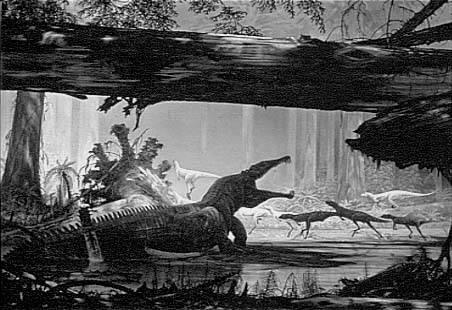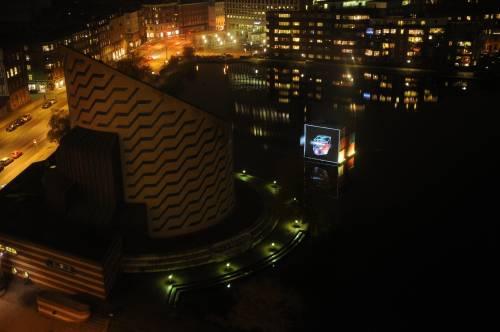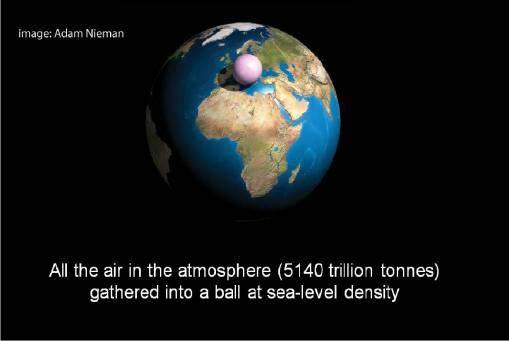The process behind altering the earth's atmosphere and therefore its climate is now well understood. Humans mine from the earth and from the bottom of the oceans the compressed fossils of organisms that lived on the planet eons ago. These beings were sustained by the energy captured from ancient sunlight beamed through space in an epoch before the first mammals had even evolved.

Photosynthetic organisms use the energy of sunlight to turn CO2 from a gas in the atmosphere into the living matter of all the creatures on earth. When these plants, algae and plankton are eaten the matter is passed up the food chain. When living organisms die if they are not consumed by another they may be transformed to soil, sedimentary rock or the infamous, so-called fossil fuels (coal, oil and gas). Thus the total mass of organic matter has been increasing on earth continuously since the dawn of life.

SUPPORTED BY HEROES LIKE YOU
Support independent eco journalism that drives real change.The industrial revolution and subsequent, derived technological expansion reverses this process. Power stations, the boiler in your cupboard and the engine in your car take the fossilized remains of ancient animals and burn them. This combustion releases the energy that was captured back in the day and returns the complex organic carbon matter back to molecular form (CO2 and water). Because we live in a 'fossil fuel economy' almost everything we do has a carbon footprint. However, because this is a new science and only recently taught in schools many people struggle to understand what a carbon footprint actually is. A carbon footprint is the carbon released into the atmosphere from whatever you do, but how can we conceptualize this?  People discussing climate change often use the unit of a tonne of co2. We know that on average in the UK we release 11 a year, about 1 a month. In the US it is about double this. Specific activities can be given a carbon footprint. For example, flying to New York releases about 3 tonnes of co2 and flying to Australia about 10.
What is this tonne? Where is this tonne? What is it doing? Even within the low carbon world this practical information is not well understood. Presumably this is because we are discussing an invisible gas. This may get to the heart of the climate challenge. No one can see it happening. The 'greatest threat humanity has ever faced' is invisible and gradual (until it goes non-linear that is; if feedback loops amplify change so that it 'runs away' change will be fast and irreversible).
Last year I worked with a crack squad of artists, architects, event producers and the world's leading projection company to construct a sculpture the size of 1 tonne of co2 at COP 15 and project upon it a range of climate themed audio visuals.
Standing in front of the work of art elicited a range of psychological, emotional and physical responses. This mega monolith manifested in downtown Copenhagen was so big (8m x 8m x 8m) it was shocking; but it was the accompanying data that really knocked the wind out of you. In total humans release 80 million of these suckers every day (2006 data). Stacked on top of each other these would go to the moon and back 1.5 times (every day). In a year the figure is 28,431,741,000 tonnes. In other words we have got cubes coming out of the ying yang!

The Cube from the Air
The exhibit culminated with a Kenji Williams performing Bella Gaia in front of the cube with exclusive NASA footage projected in the background.
This staggering scale is even more sobering when it is made relative to the total volume of the atmosphere. From the scale of us humans busy with our daily endeavours on the planet's surface the atmosphere seems enormous. It dwarfs us. However, at the scale of the planet the atmosphere is almost unnoticeable. The atmosphere and oceans are so small in comparison to the overall earth it is comparable to a film of water on a billiard ball. Even all the mighty oceans only make up 1/4000 of the earth's total mass. The scale height of the atmosphere is about 8.5 km.[[8]](http://en.wikipedia.org/wiki/Earth#citenote-earthfactsheet-9)Whereas the radius of the earth is6,371.0km[[3]](http://en.wikipedia.org/wiki/Earth#citenote-3)in other words the earth is more than 1000 times bigger than the atmosphere.

The third rock from the sun contains around it a thin layer of water, gases and vapour at a temperature of between 89°C to 57.7 °C (mean = 14°C). Within this exists all of the known life in the universe and all that most of us holds dear. For astronauts in space seeing this can be an epiphany. Here are some reactions to seeing our home from space:
[](https://cdn.ecohustler.com/media/2019/03/19/2400-3937astronaut-posters.jpg)
Looking outward to the blackness of space, sprinkled with the glory of a universe of lights, I saw majesty, but no welcome. Below was a welcoming planet. There, contained in the thin, moving, incredibly fragile shell of the biosphere is everything that is dear to you, all the human drama and comedy. That's where life is; that's were all the good stuff is.Loren Acton, USAFor the first time in my life I saw the horizon as a curved line. It was accentuated by a thin seam of dark blue light our atmosphere. Obviously this was not the ocean of air I had been told it was so many times in my life. I was terrified by its fragile appearance. Ulf Merbold, Federal Republic of Germany A Chinese tale tells of some men sent to harm a young girl who, upon seeing her beauty, become her protectors rather than her violators. That's how I felt seeing the Earth for the first time. I could not help but love and cherish her. Taylor Wang, China/USA
The total annual emissions of greenhouse gasses from human activity are a not insignificant percentage of the total atmospheric mass. If our atmosphere was the size of an apple, every year we are sticking a pea size amount of poisonous gas into it. We have been doing this since 1750. It is not unbelievable that doing this would create a change to our atmosphere and to our climate. It is unbelievable that we have been doing this for 250 years and we are still around to talk about it. Why aren't we already extinct!? The resilience of the earth's atmosphere is largely down to the dynamic nature of the ecological systems that make up the biosphere. At this point it may be worth pointing out that at the same time as pumping vast amounts of gas into the biosphere we are also removing the great forests of the world which draw co2 out of the atmosphere.
Personally I sincerely wish it was true that a group of scientists had invented climate change as an elaborate plot to usher in a world government who will curtail the rights of US gun toters, ban Christianity and create a homosexual communist utopia. The inconvenient truth that just will not go away is that thousands of different scientists in different parts of the world, using different techniques and speaking different languages are measuring and monitoring the same phenomena. We are changing our atmosphere and our climate.
Whatever your ideological stand point you need a healthy atmosphere to breathe. The people who are slowing down and hampering global efforts to preserve our atmosphere fit into 3 different categories. They are either not educated to the level to enable them to understand the science; they are stupid or they work for the fossil fuel industry. If you can't understand the science for whatever reason, we politely ask you: please step aside; your ignorance is deadly. Those who can understand the science are aware of an enormous imminent threat and are working hard to find solutions. For the other category you are worse than irresponsible. You are traitors to your species, your planet and this grand evolutionary adventure. Your greed is endangering all of the life on this planet. The best thing we could do with you would be to stick you on a planet that doesn't have an atmosphere and see how you like it when your eyes pop out of your skull rapidly followed by your evil little reptilian brain.




